PART TWO:
Apparently, I’ve stumbled upon a real American hero of World War II – not just in the usual sense as a member of our Greatest Generation – but a true warrior who even the top brass crowed about as a “magnificent young officer.” Novelist Ernest Hemingway and journalist Ernie Pyle – who attached themselves to the 22nd Infantry for five months during tough combat – apparently agreed. In addition to the Silver and Bronze stars, among other decorations, it appears that Captain Warner was nominated for two Distinguished Service Crosses (second only to the Medal of Honor) and two British Distinguished Service Orders (second only to the Victoria Cross), but that the paperwork was lost going through channels!
From Major General C. T. “Buck” Lanham, former commander of the 22nd Infantry:
December 28, 1946, to Don Warner: “…God knows there are few men in this country who more richly deserve whatever comes their way than you. I can certainly say flatly that in my opinion there was no officer in the 22nd who transcended you in gallantry. Few things have chagrinned me more than the word that you came out of this war with only one Silver Star and that very late. God only knows what ever became of the citations I personally put in for you; lost at Division I suppose.” Lanham goes on to say that a thorough search was made for those citations, among others to members of the unit, but that they were never found. There were not even copies at regimental headquarters.
“In any event all of us have the two proudest honors – we fought with the 22nd and we were combat infantrymen. All else is tinsel.”
January 6, 1956, Landham to Don Warner:
Major General Lanham mentions that his wife ran into some people in Washington, D.C., who knew Don Warner, and that he told them about the 22nd Foot: “However, if I know you, and I think I do, I am damn well sure that you told these good people everything in the world about our colleagues in the 22nd and not one damn thing about the fabulous exploits of a magnificent young officer named Don Warner. When I next see these people, and I shall before too long, they shall certainly have a fill-in on your astonishing, indeed breath-taking, performance in World War II. To this day, whenever Ernest Hemingway and I foregather and discuss the old Double Deucer, your name repeatedly stars the conversation. You and our wonderful gang were the guys who put stars on my shoulders…”
At this point, I do not know if Donald A. Warner is still alive. I suspect that he is not. A check with the Alumni Office here was unsuccessful. He appears to be one of our “lost” alumni. From the letters, I learned that Captain Warner’s wife, Ann (Hutchins?), died in the late 1960s in Mercedes, Texas. Don Warner may have been a rancher as one letter is addressed to him at Ranch ‘O Hills in Mercedes. Mercedes is a small town on the Mexican border along the Rio Grande. It is not far from Harlingen, Texas, home of the Marine Military Academy and the former home of the Confederate Air Force!
In the May 1, 1968, newsletter of the 22nd Infantry Association, Don Warner mentions the death of his wife, Ann, and then states that his son, Don A. Warner III, is a pre-med student at the University of Texas, and that his daughter, Martha Ann, is a “14 year old red head.”
When and from whom MMI received Warner’s photograph album is not recorded. As I find out more, I will pass that information along (there will be a part three!). For now, please enjoy some more photographs from Don Warner’s album:
Don Warner and Ann Hutchins (she was also known as “Higgins”).
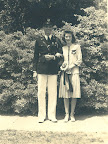
The Battalion with The Chapel in the background.
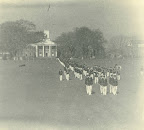
The joys of Summer School at MMI, 1939.

Flight training at the Selma airport.

Don and Ann (3rd and 4th from left) at a MMI dance.
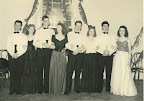
The same group of friends with Don and Ann.

Don with classmates and a future president of MMI, Thomas H. Barfield.
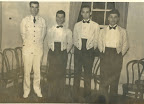
A rough pair.
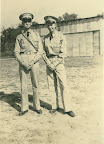
A letter from the Chief of Staff of the U. S. Army highlighting the exploits of the 22nd Infantry in World War II.
